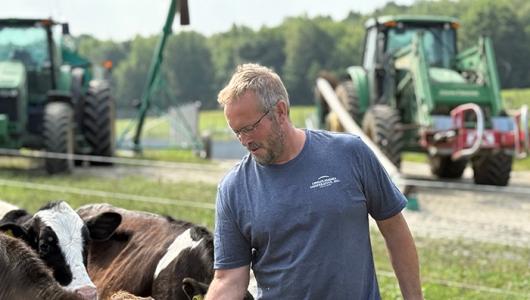Amy Frye and Jacob Slosberg own Boldly Grown Farm, a 60-acre, certified organic, mixed vegetable farm in Skagit Valley, Washington. They grow and sell their products year-round, with their primary focus being high-quality fall and winter vegetables for wholesale markets. They also operate a 325-member winter Community-Supported Agriculture (CSA) program, where members pay up front for a regular supply of fresh produce throughout the season, and a year-round farm stand. Amy and Jacob grow approximately 35 acres of vegetables plus grains, dry beans, flowers, seed crops, and eggs from their pasture-raised chickens.
Recently, Amy and Jacob utilized the Natural Resources Conservation Service’s (NRCS) Environmental Quality Incentives Program (EQIP) to enhance their operation’s energy efficiency thanks to funding provided by the Inflation Reduction Act.
The Inflation Reduction Act provides an additional $19.5 billion for NRCS to deliver financial and technical assistance to producers for certain mitigation activities through existing USDA conservation programs, like EQIP. When applied appropriately, these activities are expected to reduce greenhouse gas emissions or increase carbon sequestration. Energy efficiency conservation practices like Energy Efficient Building Envelope can help to save energy or fuel use, which in turn can reduce the greenhouse gas emissions associated with fossil fuel energy production and fuels.
In the Spring of 2023, Amy, Jacob, and NRCS teamed up with the local Skagit Conservation District to utilize the first round of Inflation Reduction Act funding to make their packing warehouse more energy efficient. The project was completed in October of that year.
“We received funding to help pay for an insulation package for the building to make it so that we are using less energy to heat it during the winter,” Jacob said.

As a farm that produces mostly fall and winter crops grown in the cooler Pacific Northwest, it is highly important to maintain storing and working temperatures above freezing to prevent damage to the produce. Keeping warmer indoor temperatures all winter comes at a high cost for a farm that utilizes diesel-powered heaters. That is why this insulation package was so important to Amy and Jacob.
“It is definitely saving us money and energy,” Jacob said. “We are reaping the benefits in both saved energy and costs like fuel that goes into the heater. It is also improving the quality of the produce by it reducing the freeze or cold damage.”

For Boldly Grown Farm, this project has greater implications than simply saving energy and money, while also reducing emissions. With a strong understanding of their agricultural community, Jacob discussed how this project has a multiplying effect in positive environmental outcomes.
“It increases produce storage capacity onsite and therefore improves local food access,” Jacob said, “which in-turn reduces miles driven to deliver food, which reduces greenhouse gas emissions.”
This recent project is just one of a few that Jacob and Amy have been working on with their local NRCS Field Office in Mount Vernon, Washington, since purchasing their land a few years ago.
“It’s been important to have a partner within NRCS that we can rely on to help us understand the strengths and limitations of certain programs,” said Jacob.
Over the years, Jacob and Amy have worked hard for their farm to be energy efficient, Certified Organic, Salmon Safe Certified, and Good Agriculture Practices (GAP) Certified. Earning and maintaining a farm with these credentials requires a great deal of knowledge, determination, and a love for the environment that is on full display with one look around their beautifully maintained property.


